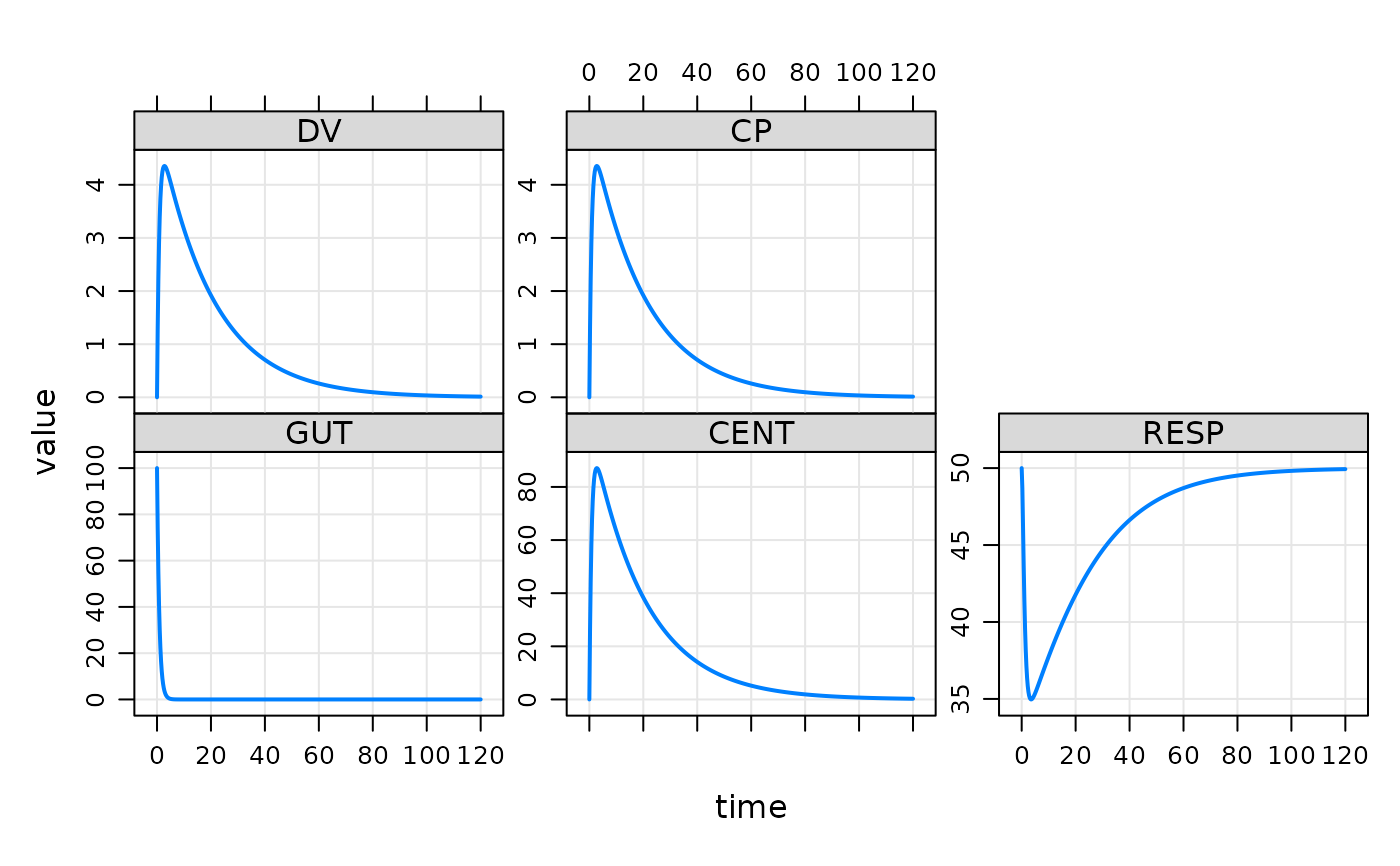These methods help the user view simulation output and extract
simulated data to work with further. The methods listed here
for the most part have generics defined by R or other R packages.
See the seealso section for other methods defined
by mrgsolve that have their own documentation pages.
# S4 method for mrgsims
$(x, name)
# S4 method for mrgsims
tail(x, ...)
# S4 method for mrgsims
head(x, ...)
# S4 method for mrgsims
dim(x)
# S4 method for mrgsims
names(x)
# S4 method for mrgsims
as.data.frame(x, row.names = NULL, optional = FALSE, ...)
# S4 method for mrgsims
as.matrix(x, ...)
# S3 method for mrgsims
summary(object, ...)
# S4 method for mrgsims
show(object)Arguments
- x
mrgsims object
- name
name of column of simulated output to retain
- ...
passed to other functions
- row.names
passed to
as.data.frame- optional
passed to
as.data.frame- object
passed to show
Details
Most methods should behave as expected according to other method commonly used in R (e.g. head, tail, as.data.frame, etc ...)
$selects a column in the simulated data and returns numericheadseehead.matrix; returns simulated datatailseetail.matrix; returns simulated datadim,nrow,ncolreturns dimensions, number of rows, and number of columns in simulated dataas.data.framecoerces simulated data to data.frame and returns the data.frameas.matrixreturns matrix of simulated datasummarycoerces simulated data to data.frame and passes tosummary.data.frameplotplots simulated data; seeplot_mrgsims
See also
Examples
## example("mrgsims")
mod <- mrgsolve::house() %>% init(GUT=100)
out <- mrgsim(mod)
class(out)
#> [1] "mrgsims"
#> attr(,"package")
#> [1] "mrgsolve"
if (FALSE) {
out
}
head(out)
#> ID time GUT CENT RESP DV CP
#> 1 1 0.00 100.00000 0.00000 50.00000 0.000000 0.000000
#> 2 1 0.25 74.08182 25.74883 48.68223 1.287441 1.287441
#> 3 1 0.50 54.88116 44.50417 46.18005 2.225208 2.225208
#> 4 1 0.75 40.65697 58.08258 43.61333 2.904129 2.904129
#> 5 1 1.00 30.11942 67.82976 41.37943 3.391488 3.391488
#> 6 1 1.25 22.31302 74.74256 39.57649 3.737128 3.737128
tail(out)
#> ID time GUT CENT RESP DV CP
#> 476 1 118.75 9.202240e-44 0.2753340 49.92950 0.01376670 0.01376670
#> 477 1 119.00 5.342789e-44 0.2719137 49.93038 0.01359569 0.01359569
#> 478 1 119.25 2.453278e-44 0.2685360 49.93124 0.01342680 0.01342680
#> 479 1 119.50 2.498865e-44 0.2652002 49.93209 0.01326001 0.01326001
#> 480 1 119.75 1.869677e-44 0.2619058 49.93293 0.01309529 0.01309529
#> 481 1 120.00 1.163038e-44 0.2586523 49.93377 0.01293262 0.01293262
dim(out)
#> [1] 481 7
names(out)
#> [1] "ID" "time" "GUT" "CENT" "RESP" "DV" "CP"
mat <- as.matrix(out)
df <- as.data.frame(out)
if (FALSE) {
out$CP
}
plot(out)
 if (FALSE) {
plot(out, CP~.)
plot(out, CP+RESP~time, scales="same", xlab="Time", main="Model sims")
}
if (FALSE) {
plot(out, CP~.)
plot(out, CP+RESP~time, scales="same", xlab="Time", main="Model sims")
}